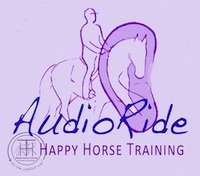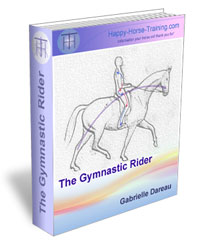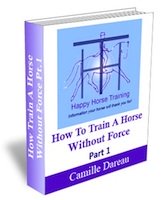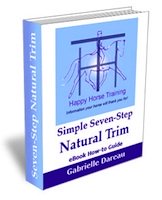|
Horse colic: prevention is better than cureHorse colic is a serious matter. The horse's digestive system works very efficiently, and is rarely upset if the right conditions are met to a reasonable degree. If they are not met however and colic occurs, it is always painful, and often extremely painful, for the horse. Interestingly, although only 10% of cases are fatal, colic is still the cause of 90% of all horse death. This shows what a very big problem it actually is. The most common reason for fatality is when a section of the gut 'twists' or flips over. This is not wholly understood, and may be caused by impaction, or indeed it may cause impaction which freezes the gut movement. People used to think it was caused by violent behavior i.e rolling from the pain, but this is difficult to prove or disprove. In any case when the circulation to this area is compromised the gut may die, and without surgery the horse will die. Surgery is possible if action is taken quickly enough, but the chances of a full recovery are never good because complications such as infection and adhesions forming are common even if the initial operation is successful. The fact is that it need not happen in the first place. A healthy digestive system is not susceptible to such an extreme dysfunction. In the case of horse colic, the adage 'Prevention is better than cure' has never been more true. We have not had a serious horse colic in over fifteen years, and we would consider it unusual if we had more than a few very minor ones in a year. We did lose a horse 25 years ago in horrific circumstances. He had been starved and died in agony from a twisted gut due to worm damage, thankfully he is the only horse we have lost to colic.
Go to our Horse Nutrition page for an in-depth look at this important subject. Horse colic is one of the problems that often results from not addressing the horse's lifestyle holistically. Go to horse health for more information about how we can the horse's general well-being. One of the best ways to promote a healthy spine and help keep the horse's digestive system functioning optimally is through good training, developing longitudinal stretching through engagement. For more information on this see both real dressage riding and training horses
Relevant pages on Happy Horse training that may interest you: |
New from HHT!
AudioRide is a series of exercises designed to listen to while you ride.
Audio descriptions guide you through each step of developing a balanced, dynamic connection with the horse through your position.
This truly innovative learning tool gives you a whole new way of being guided in your riding, in a calm, clear, step-by-step way.
Free Download! Introductory Exercise: Riding in the Now
Click here for full details
The Gymnastic Rider eBook
Now available exclusively from HHT! A unique, comprehensive guide to practical rider biomechanics. This professionally produced eBook takes the rider through the process of developing their body in the specific way that brings the horse's movement into harmony and balance - without force and constraint. Click here for full details, and to download the 15-page introduction for free.
Join the Happy Horse Training group on Facebook!
See and share topical info, news and photo's, and take part in lively discussions.
Click here to go to the HHT group and then click on the 'join group' button.
Join the Whole Horse Newsletter
HHT's free monthly newsletter giving you wide-ranging and intelligent insights into holistic horsemanship.
Just enter your details below to join.
Free bonus on the riding position with all new subscriptions: Ten Top Tips To Instantly Improve Your Connection With Your Horse.
Click here to see back issues of The Whole Horse newsletter
Train Your Horse
The Holistic Way
How To Train A Horse Without Force is a unique guide to training horses through energetic connection and gymnastic training. Part 1 covers everything on the ground, from handling to the lungeing technique that develops strength, straightness and engagement. Comes with a free eBook supplement on Horse Trauma.
Click here for more details.
What people say about the eBook:
"OMG! I'm BLOWN AWAY by this text [...] It's one of the best horse training texts I've ever read." - Wendy Kendall
"I realized that I haven't yet written you about the impact that your training e-book has had on me, and I want to let you know how inspiring and helpful I found it. As a student of Zen Buddhism for nearly three decades, I've often wondered when someone was going to write the book on Zen and the art of horsemanship, and I think that your emphasis on mindfulness and energy connection gets right at the heart of the matter. It has certainly deepened the way that I relate to and communicate with my horses. I am reasonably sensitive to horses' body language and mood, but new to me was the idea of feeling their energy in a more subtle way - including their connection with me even when I am not directly working with the them. I have made myself more aware of this communication, and it's pretty amazing. I have started grooming differently, too, treating a grooming session as a time to mindfully listen to my horse instead of a way to dust out an old rug (OK, I wasn't quite that bad, but you get the idea). Additionally, I have made myself more open to how I actually feel about the horses themselves - very enlightening. Overall, I think that you are saying something that no one else is saying but that everyone ought to hear." - Tess Lloyd
Do You Have
A Horse Story
To Share On HHT?
So many people have been through wonderful experiences with horses, whether in training or otherwise. If you've made a change in a horse's life - or one has made a change in yours - tell us about it here.
Learn How To Trim
Your Own Horse's Feet
The Simple Seven-Step Natural Trim is a comprehensive step-by-step guide to a cutting-edge barefoot trim. Click here to find out more.
What people say about HHT:
"The riding instruction is outstanding, if instructors in the UK taught this way there would be a lot of happy riders and horses."
"The riding tuition exceeded my hopes and expectations by a long way; giving me an exciting new facet to horsemanship which is lighter. more subtle, more elegant and more meaningful. It is as if a new door has opened bringing more sunlight and air."
"My goodness - what a change has taken place in my riding. I think that I'm starting to sit 'into' the horse rather than on top of him. I felt my horse's movements in a way that has almost never happened before"
Click on Testimonials for more









